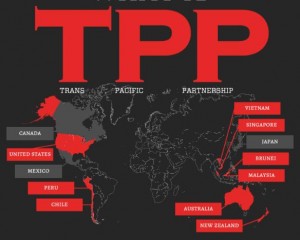Inside U.S. Trade reports that USTR has “effectively wrapped up” negotiations with Vietnam and Singapore and “will seek to bring TPP ‘to some kind of a conclusion’ when ministers meet later this month in Hawaii.” Froman has delivered an “ultimatum” to Malaysia.
Reps. Schakowsky and DeLauro joined MSF, AARP and others at a press briefing on IP and Access to Medicines. Rep. Schakowsky told the press that “What is clear is that it is U.S. negotiators who are pushing to tilt the balance between intellectual property rights and public health even more toward the brand-name drug companies.”
Japan Forum for the Intellectual Property Aspects and Transparency of TPP – Urgent Appeal on TPP Intellectual Property Provisions: “It is generally accepted that ill-conceived copyright term extension dramatically increases the number of “orphan works” copyright-protected works for which rightsholders are positively indeterminate or not contactable. Orphan works are a serious impediment to digitization, and because of this, the possibility of a shortened term has been seriously discussed even in the U.S. Respected empirical research have also demonstrated that making the term extremely long does not even bring any meaningful revenue to most of the author’s heirs, while increasing unusable works due to the difficulty of rights clearance, and raising the complication for new creation based on old works. In the Japanese context, the term extension will also result in the fixation or even increase in the trade deficit of copyright, hence the criticism that this is contrary to the idea of founding our nation on intellectual properties.”
James Love and Andrew Goldman from Knowledge Ecology International letter to the Department of Health and Human Services. Three main points are “1) There is a need for exceptions to exclusive rights in pharmaceutical and biologic drug test data; 2) WTO standards for compulsory licenses should not be modified as part of a secret negotiation, or constrained by a 3-step test; 3) The TPP standards for damages are contrary to several U.S. statutes, and require an amendment of the Affordable Care Act incentives to disclose patent landscape on biologic drugs.”
Michael Geist’s column in the Hill Times. “The deal reportedly also penalizes Canada for its “notice-and-notice” system for claims of infringement on the internet. The system has been in effect since the start of the year and has been credited with significantly reducing Canadian piracy rates. The Canadian approach differs from that found in the U.S., however, leading to additional demands that Canada establish enforcement provisions targeting internet providers and search engines… New rules related to copyright, patents, privacy, and investor lawsuits have serious implications for the rights of Canadians as well as for consumer, health-care, and education costs. With the TPP in the final stages, Canadians deserve better than canned responses from political parties and a debate limited to the impact of the deal on the agricultural sector.”
Amy Kapczynski’s column in the New England Journal of Medicine: “TPP could impose obligations on developing countries that go far beyond any existing trade agreement. Indeed, some proposals in the leaked IP chapter seem directly targeted against innovative measures that developing countries have used to maximize the use of low-cost generic medicines.”
Fran Quigley in Foreign Affairs. “This month’s final talks will lump together patent discussions with negotiations on issues such as agriculture and textile and footwear exports, leaving objections to U.S. intellectual property terms vulnerable to political tradeoffs. We can only hope that those pushing for the protection of access to medicine will be able to hold out for a decent bargain for those in need.”





